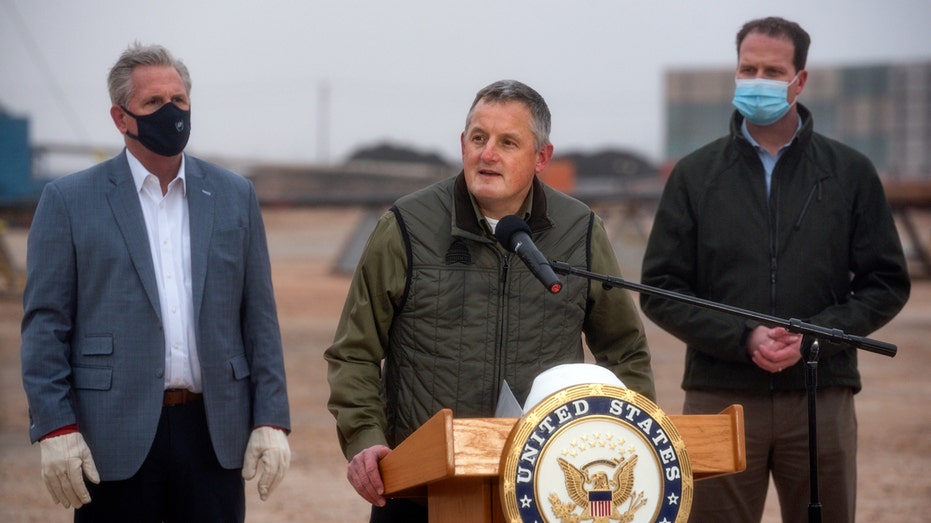House Republicans are preparing to unveil a series of bills designed to increase energy production on federal lands, reduce project permitting delays and strengthen domestic critical mineral supply chains.
On Tuesday, Republicans on the House Natural Resources Committee will hold two hearings examining three pieces of legislation they argue are vital for maintaining energy independence through traditional fossil fuel production and mining required for green energy technologies. GOP leaders plan to bundle the bills into a permitting reform package and move them through committee in the coming weeks.
“What we’ve seen out of this administration is policies that have locked up both conventional energy sources like oil and gas, as well as blocking mineral production that is required for renewable energy streams,” Rep. Garret Graves, R-La., told Fox News Digital in an interview. “The impact on the consumer has been pushing more people into energy poverty.”
“We’ve seen utility bills go up for heating and cooling homes, we’ve seen gasoline, fuel prices go up,” he continued. “And, of course, that just sort of cascades through the economy because every manufacturer, every Amazon driver, every pizza delivery person is paying these higher cost.”
BIDEN ADMIN QUIETLY ADMITS WHITE HOUSE’S 9,000 UNUSED OIL PERMITS TALKING POINT IS WRONG
Graves’ legislation — the Building United States Infrastructure through Limited Delays and Efficient Reviews (BUILDER) Act — is among those being examined by the committee. The bill proposes to broadly reform the permitting process for projects requiring federal approval, limit litigation and narrow the focus of environmental reviews.
Under the National Environmental Policy Act, projects including oil and gas drilling are required to go through successive rounds of permitting which can take months or, sometimes, years for relevant agencies to green light. In April, the White House reversed Trump-era rules that aimed to streamline the process in a move blasted by renewable energy and fossil fuel industry proponents alike.
FOSSIL FUEL PROFITS ARE VITAL FOR GREEN ENERGY PROJECTS DEMS ROUTINELY TOUT
In 2020, the Trump administration released a report showing that the federal government on average takes 4-5 years to complete environmental reviews. The Federal Highway Administration takes seven years on average, the longest of any agency, and the Bureau of Land Management (BLM), which is tasked with approving fossil fuel drilling permits, takes more than four years on average.
“We believe that we can streamline this process without sacrificing any of the environmental reviews,” a Natural Resources committee staff member told reporters in a briefing Monday. “And, as a result, we can, not only provide benefits to communities that have been struggling economically by having new projects built, but we can also lead to better environmental outcomes.”
In addition to Grave’s legislation, committee Republicans will also review the Transparency and Production of American Energy Act, introduced by Chairman Bruce Westerman, R-Ark., and the Permitting for Mining Needs Act, introduced by Rep. Pete Stauber, R-Minn., the chairman of the panel’s Energy and Mineral Subcommittee.
Westerman’s bill would require the Biden administration to resume onshore oil, gas and geothermal lease sales and includes strict deadlines for offshore oil and gas lease sales.
The Biden administration has held a small amount of lease sales compared to every administration dating back nearly 80 years. It has also repeatedly delayed issuing a congressionally-required plan for offshore lease sales.
JOE BIDEN HAS HAMPERED DOMESTIC ENERGY INDUSTRY WHILE PLEADING FOR MORE FOREIGN OIL
“America should be the world leader in energy and mineral production and innovation,” Westerman said earlier this month. “We have the brightest minds, the most rigorous environmental standards and vast reserves of natural resources.”
“Yet we’ve seen the Biden administration deal blow after devastating blow to our resources, crippling communities that depend on energy jobs and revenues, weakening us on the global stage and threatening our long-term energy security.”
The Biden administration has also been accused of purposely delaying drilling permits in an effort to prevent fossil fuel extraction. According to BLM data, there were 4,896 pending drilling permits on federal lands and another 179 on Indian property as of Jan. 31.
While gasoline prices have fallen from their all-time high of more than $5 per gallon in June, they remain about 45% higher than when President Biden took office in January 2021.
Oil production on federal lands, meanwhile, fell to 12.28 million barrels per day in November, the latest month with data, according to the Energy Information Administration. Production peaked at 13 million barrels a day under the Trump administration.
US EMERGENCY OIL STOCKPILES DROP TO LOWEST LEVEL SINCE 1983 AS GAS PRICES TICK UP
“What we’re doing is basically looking at and this is a math equation to tell us — simply looking at what our energy demands are projected to be, whether it’s oil and gas or renewable sources, and making sure that we have a compatible domestic energy strategy to go along with it,” Graves said.
And Stauber’s legislation aims to fortify critical mineral production in the U.S. by reducing permitting times and preventing efforts to slow projects through litigation. The National Mining Association has warned that several regulatory burdens, including a years-long permitting process, are blocking the U.S. from establishing a foothold in mineral supply chains.
“Our House Republican majority is serious about restoring American mineral dominance, and the PERMIT-MN Act is the tip of the spear,” Stauber said after introducing the bill last month. “Let’s pass this commonsense legislation and get shovels in the ground while protecting our environment. Our nation’s security depends on it.”
Green energy technologies like electric vehicle batteries, battery storage facilities, solar panels and wind turbines require a massive expansion of cobalt, copper, lithium, nickel, graphite, zinc and other mineral production, according to the International Energy Agency.
However, the Biden administration has taken steps to restrict domestic mineral production, actions that experts have warned will increase U.S. reliance on foreign nations like China and Russia. For example, the Department of the Interior announced on Jan. 26 that it had placed a 20-year mining ban on a region in northern Minnesota that is home to vast mineral resources important for green energy development.
The Republican attempt to tackle permitting reform, meanwhile, comes months after a joint effort, from President Biden and Sen. Joe Manchin, D-W.Va., to tackle the issue stalled in the Senate. Manchin and Westerman have engaged in talks on building bipartisan support for the push over the last month.
“I think it’s a high priority, which both sides know that we need it. Everyone has come to agreement that you got to have permitting,” Manchin told reporters on Feb. 1, according to E&E News. “Let’s take the politics out of it, and do what’s doable.”
























